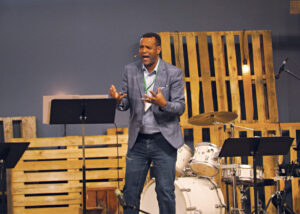Our society is in the middle of a painful, promising and complicated shift. We know we need to stop burning fossil fuels. We need to transition to energy systems that are less polluting and less extractive while also learning to use less energy and consume less altogether.
It’s a challenging time, but not one without precedent.
Near the end of the 1700s, three-quarters of the global population was living under some kind of slavery or serfdom. Each year, 80,000 chained humans were transported across the Atlantic to work on plantations. Much of the economy of western Europe and the Americas depended on slave labour.
On May 22, 1778, 12 men met in a print shop in England to hatch a plan. All but one were Quakers, a persecuted sect who numbered fewer than 20,000 in England. They were pacifist, non-hierarchical and committed to consensus-based decision making. And they believed slavery was a sin.
For years they had been writing letters to newspapers, distributing pamphlets and using guerrilla theatre to make their point. No one listened.
The meeting in the print shop marked a pivotal point. The Quakers began collabo- rating with a non-Quaker activist named Thomas Clarkson, an Anglican who crisscrossed England on horseback spreading the message about the evils of slavery.
The Quakers’ moral vision, sharpened by their experience as a persecuted minority and coupled with their advocacy skills, allowed them to play a key role in the anti-slavery movement. Rooted in faith, they worked tirelessly for a seemingly impossible cause.
As members of Mennonite Church Manitoba’s (MCM) Climate Action Working Group (CAWG)—a volunteer group that helps congregations respond to the climate crisis with personally and societally transformative actions—we draw inspiration from current and historical liberation struggles.
The work of climate justice is the work of our time. It will require the transformation of hearts, habits, churches and society.
The burning of fossil fuels is the principal driver of climate change and is the cause of great ecological and human injustice. How can we extricate ourselves from this unjust system?
How can we replace it with more just, equitable and life-sustaining systems?
We can’t. Not alone. Quakers were ineffectual until they joined others.
At the MCM annual gathering in March, delegates voted for MCM to join hundreds of other faith groups, non-profits, cities and island nations around the world in calling for an international treaty to end the extraction and burning of fossil fuels and transition fairly to clean energy. This is a small and symbolic step, but it represents months of study, conversation and organizing in congregations. This step helped us situate our work within the broader global struggle and gave us opportunity to educate ourselves, talk with congregations, gather feedback, field questions and practise moving a disparate body toward collective action.
Leading up to the vote, we visited 11 congregations, preached sermons, led Sunday school discussions and hosted information sessions. We worshipped, ate and discerned scripture together. We experienced the good of being church together.
We were challenged by people who questioned this step and those who wanted us to do more.
A century after the meeting in the Quaker print shop, slavery had been formally outlawed—at least on paper— nearly everywhere. It took massive education campaigns, pressure tactics like sugar boycotts and even bloody revolts led by enslaved people. Throughout the struggle, Quakers played a faithful role.
Then and now, two responses are required: individual change and structural change. While Quakers freed those they had enslaved and paid them compensation, the Quakers remained entangled in an economy dependent on slavery. Slavery itself needed to end.
Neither individual nor systemic change can happen alone.
Singing the call for a fossil fuel treaty was an opportunity to study the ways in which we are entangled in an unjust global energy system. But it is only one step. We intend to draw on the relationships we’ve build during this process in order to help congregations take further steps, such as:
- Advocacy.
- Organizing with local and national climate groups.
- Reducing our energy use.
- Working with Indigenous communities affected by climate change.
- Reorienting growth-addicted economic systems.
- Promoting incentives that help communities transition.
Each congregation must find its own place in this movement. To learn more about what your regional working group is doing, see mennonitechurch.ca/climate-action.
Josiah Neufeld lives in Winnipeg and is a member of the Climate Action Working Group.







Leave a Reply
You must be logged in to post a comment.